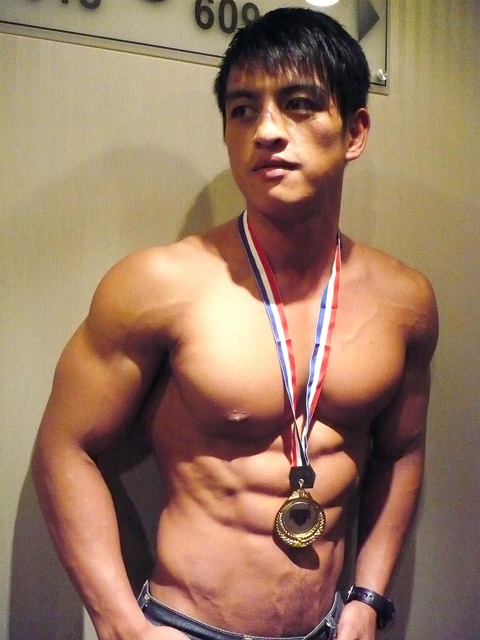For Lin Shao-hua (林少華), the strenuous physical training over the last two months all became worthwhile when he was named first runner-up in the “Mister Physique” category in the annual 2008 Manhunt International last Monday.
Lin, a 25 year-old gym instructor from the Atayal tribe, was the third Taiwanese man to win a prestigious award at an international male beauty contest.
Lin said yesterday that when contenders from other countries first saw him, they often mistook him as Latin American because of his sculpted muscles and tanned skin.

PHOTO: HSIEH WEN-HUA, TAIPEI TIMES
“When I said I am from Taiwan, they often found it surprising,” Lin said, “because many foreigners still have the stereotype that Taiwanese male models are often tall, skinny and pale.”
Two months prior to the competition, Lin trained for three hours each day and maintained a strict high-protein low carbohydrate diet. To burn the extra fat off his body, Lin said he often did his jogging routine wearing heavy jackets and long pants so he would “sweat it out.”
Lin said he was able to shed 10kg using his self-designed regimen.
Manhunt International is the largest male-model beauty pageant in the world. The competition is made up of two phases. An online contest was held for voting on all contenders.
The top 15 winners from the online competition were then eligible to participate in the on-stage competition.
Lin did not get any votes at first, but won more than 23,900 votes and placed seventh after the Chinese-language Liberty Times (the Taipei Times’ sister paper) reported on his endeavor to win the competition.
A senior at Yuan Ze University, Hsu Poh-hsiang (�?�), won the “best newcomer and best traditional costume” award in last year’s International Man Competition, and Hung Chi-feng (洪啟峰) of the National Taiwan University of Science and Technology, clinched the “Most Popular” award in the 2008 Mr. Universe Model competition.
Hsu, however, refused to accept his award because organizers tried to force him to participate as “Mr. China” instead of “Mr. Republic of China.”

MORE VISITORS: The Tourism Administration said that it is seeing positive prospects in its efforts to expand the tourism market in North America and Europe Taiwan has been ranked as the cheapest place in the world to travel to this year, based on a list recommended by NerdWallet. The San Francisco-based personal finance company said that Taiwan topped the list of 16 nations it chose for budget travelers because US tourists do not need visas and travelers can easily have a good meal for less than US$10. A bus ride in Taipei costs just under US$0.50, while subway rides start at US$0.60, the firm said, adding that public transportation in Taiwan is easy to navigate. The firm also called Taiwan a “food lover’s paradise,” citing inexpensive breakfast stalls

TRADE: A mandatory declaration of origin for manufactured goods bound for the US is to take effect on May 7 to block China from exploiting Taiwan’s trade channels All products manufactured in Taiwan and exported to the US must include a signed declaration of origin starting on May 7, the Bureau of Foreign Trade announced yesterday. US President Donald Trump on April 2 imposed a 32 percent tariff on imports from Taiwan, but one week later announced a 90-day pause on its implementation. However, a universal 10 percent tariff was immediately applied to most imports from around the world. On April 12, the Trump administration further exempted computers, smartphones and semiconductors from the new tariffs. In response, President William Lai’s (賴清德) administration has introduced a series of countermeasures to support affected

CROSS-STRAIT: The vast majority of Taiwanese support maintaining the ‘status quo,’ while concern is rising about Beijing’s influence operations More than eight out of 10 Taiwanese reject Beijing’s “one country, two systems” framework for cross-strait relations, according to a survey released by the Mainland Affairs Council (MAC) on Thursday. The MAC’s latest quarterly survey found that 84.4 percent of respondents opposed Beijing’s “one country, two systems” formula for handling cross-strait relations — a figure consistent with past polling. Over the past three years, opposition to the framework has remained high, ranging from a low of 83.6 percent in April 2023 to a peak of 89.6 percent in April last year. In the most recent poll, 82.5 percent also rejected China’s

PLUGGING HOLES: The amendments would bring the legislation in line with systems found in other countries such as Japan and the US, Legislator Chen Kuan-ting said Democratic Progressive Party (DPP) Legislator Chen Kuan-ting (陳冠廷) has proposed amending national security legislation amid a spate of espionage cases. Potential gaps in security vetting procedures for personnel with access to sensitive information prompted him to propose the amendments, which would introduce changes to Article 14 of the Classified National Security Information Protection Act (國家機密保護法), Chen said yesterday. The proposal, which aims to enhance interagency vetting procedures and reduce the risk of classified information leaks, would establish a comprehensive security clearance system in Taiwan, he said. The amendment would require character and loyalty checks for civil servants and intelligence personnel prior to